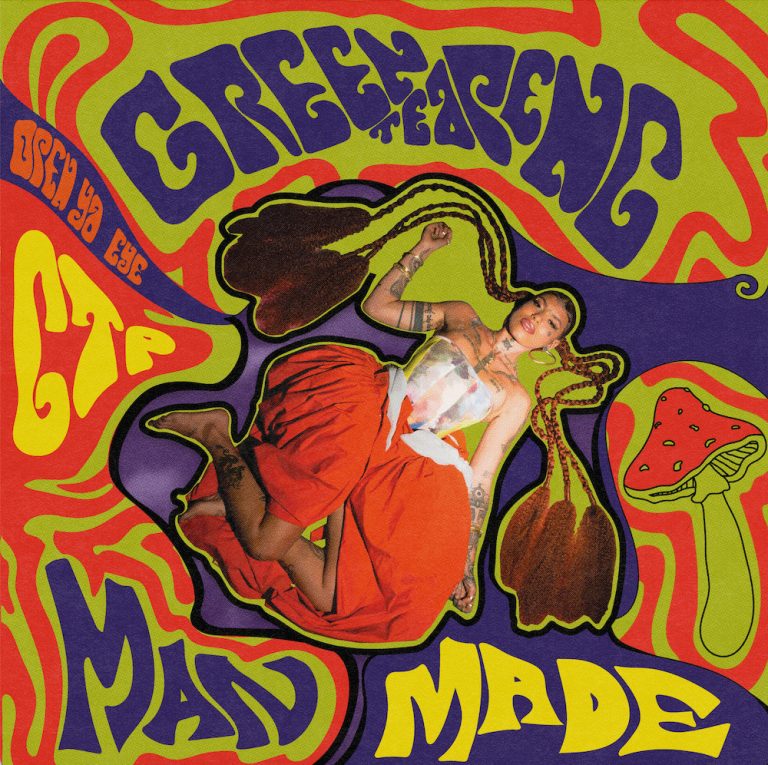Greentea Peng is here to be heard, but she’s not making noise just for the sake of it. As she makes abundantly clear on “Make Noise” and “This Sound”, the opening couplet from her debut album MAN MADE, she’s asking you to listen, because she’s got a lot to say and share. She doesn’t need to be boisterous or controversial to capture your attention; she merely leaves open the door to her chamber, beats and smoke wafting out, and it’s your decision as to whether you enter.
It’s been a busy road for the London vocalist and rapper to get to MAN MADE, with a long string of singles, EPs and guest features cropping up over the course of the last few years. Each one showed a new facet of Peng, and with each new step it felt like a little more of her potential was revealed. Now fully embodying the woman, artist and performer she’s been growing towards, she guides her band – the Seng Seng Family, who recorded live in studio – through an hour’s worth of genre-hopping, mood-altering and convention-challenging music.
MAN MADE is not for everyone, especially those cynical about the benefits of alternative lifestyles. The album was recorded at 432 Hz, a semitone lower than most albums, as it is a frequency that is supposed to vibrate healing energy, and the album’s interlude “Party Hard” features Peng repeating “eat some shrooms.” If you’re not on board with these ideas, then this one’s not for you.
Not that Peng is here merely to espouse the virtues of music, meditation and mushrooms; MAN MADE, from title on down, is a political record. But it’s certainly not one that puts philosophical debate ahead of a party mood – after all, what’s more unifying than a mass of people sharing a vibe and a moment? It’s in this atmosphere of ease and equality that the most valuable discussions can be had, after all.
Peng’s words are full of pointed opinions, but she prefers to let her diatribes unfurl in heady rap-sung poetry that twirls atop the Seng Seng Family’s vibrant playing. “Free My People” finds her taking fire at inequality, but with the band’s energised reggae sound – flowing funk bass, sashaying rhythm guitar, tickling synth flute – it’s a limb-loosening delight. “Kali V2” is a meditation on people’s suffering and the “lies in this fickle paradise”, Peng’s tongue at its sharpest – but it’s not an outspoken protest song, it’s a laid back and loungey proposition where she and her band simply invite you to spend some time with them and come to your own conclusions.
With the power of the Seng Seng Family behind her, Peng is able to zoom in and out from the personal to the universal with intoxicating smoothness. “Nah It Ain’t The Same” pulls together classic hip-hop scratching and jazz keys, Peng sounding as if she’s barely batting an eyelid as she enters full-flow, lamenting “this uncertainness only seems to serve the misery” in a verse that eventually sees her confronting the higher power: “Chatting to God, unworthy of His time / With all these doubts in my mind.” It’s a face-off that continues internally on the following “Earnest”, where the band slow it down to complement her moonlit musings, her confidence cast aside as she vulnerably asks “are my words to god earnest?”
Although this is an album about oneness, we are here for Peng, and these moments where we feel closest to her as a person are some of the most rewarding. Following the aforementioned “Earnest” comes “Suffer”, where her eyes are full of tears as she wades through “the dread inside my head”; the Seng Seng Family providing a chopped and demure version of their usual jazz-hop stylings to accentuate her uncertainty. The low-lit “Sinner” finds her in midnight confession, battling her devilish instincts that rise up with the sound of a crackling electric guitar. On the other end of the scale is “Dingaling”, where she’s in thrall to her “African queen / the girl of my dreams,” the band providing a rhythmic delight that rolls delectably like the hips of the woman who’s caught her eye. But her biggest love is music itself, as she repeatedly expresses on “Meditation”, where her weightless professions of happiness float atop beautiful African drums in a moment of pure feeling.
It’s on the title track where the personal, universal and political come to a head. One of the sparest songs on the album, with a basic beat underlining Peng’s words while atmospheric piano sparkles in the atmosphere, “Man Made” finds her reflecting on her artistic process: “I go through pens, I go through paper tryin’ to proclaim it / And when I lost hope, you’ll know ’cause I don’t say shit.” Despite all the pernicious elements in the world, she hasn’t lost hope yet, so neither should we – we should take a leaf from Peng’s book as she affirms “I don’t need your Man-made seeds to grow.” With this album, she’s proven that statement true – and hopefully, in her own low-key way, she’ll push her listeners to a similar place of self-belief and determination for change.


